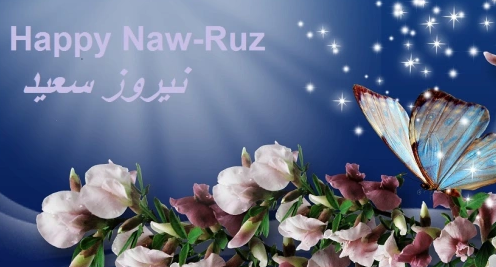What is Nowruz in Baháʼí Faith? – Baháʼí Naw-Rúz
celebration of the feast of Nowruz in Baháʼí Faith. For the main article, see Nowruz.
Key dates of the Baháʼí calendar
Year Ayyám-i-Há Fast Naw-Rúz
2024 26 Feb 29 Feb 1 Mar 19 Mar 20 Mar
2025 25 Feb 28 Feb 1 Mar 19 Mar 20 Mar
2026 25 Feb 1 Mar 2 Mar 20 Mar 21 Mar
2027 26 Feb 1 Mar 2 Mar 20 Mar 21 Mar
2028 26 Feb 29 Feb 1 Mar 19 Mar 20 Mar
2029 25 Feb 28 Feb 1 Mar 19 Mar 20 Mar
Naw-Rúz (Persian: نوروز, romanized: Nowruz) is the first day of the Baháʼí calendar year and one of eleven holy days for adherents of the Baháʼí Faith. It occurs on the vernal equinox, on or near March 20- 21, which is also the traditional Persian New Year.
The traditional Nowruz holiday, from which the Baha’i holiday derives, has been celebrated since ancient times in Iran, and is observed by culturally-adjacent peoples in Azerbaijan, Turkey, Uzbekistan, Turkmenistan, Iraq, Armenia, Georgia, Russia, Afghanistan, Pakistan, Syria, and Tajikistan.
The Báb, the founder of Bábism, and then Baháʼu’lláh, the founder of the Baháʼí Faith, adopted the day as a holy day and associated it with the Most Great Name of God.
The Baha’i holiday as now calculated does not always fall on the same day as the traditional festival (but may differ by one day), and does not incorporate a number of Persian cultural practices associated with the traditional holiday, but is a religious event featuring readings from Baha’i scriptures.
Significance
The Báb, the founder of Bábi religion, instituted the Badíʻ calendar composed of 19 months, each of 19 days
The first month, and the first day of each month, are both named Bahá, an Arabic word meaning splendour or glory. Thus Naw-Rúz, the first day of the year, is the day of Bahá in the month of Bahá.
The day was called the Day of God by the Báb, and was associated with He whom God shall make manifest, a messianic figure in the Báb’s writings.
Baháʼu’lláh, the founder of the Baháʼí Faith who is recognized as the messianic figure expected by the Báb, adopted the new calendar and the use of Naw-Rúz as a holy day.
The day follows the Baháʼí month of fasting, and he explained that Naw-Rúz was associated with the Most Great Name of God,
and was instituted as a festival for those who observed the fast.
The symbolic notion of the renewal of time in each religious dispensation was made explicit by the writings of the Báb and Baháʼu’lláh and the calendar and the new year made this spiritual metaphor more concrete.
ʻAbdu’l-Bahá, Baháʼu’lláh’s son and successor, explained that significance of Naw-Rúz in terms of spring and the new life it brings.He explained that the equinox is a symbol of the Manifestations of God, who include Jesus, Muhammad, the Báb and Baháʼu’lláh among others, and the message that they proclaim is like a spiritual springtime, and that Naw-Rúz is used to commemorate it
Date
Baháʼu’lláh, in the Kitáb-i-Aqdas, defines Naw-Rúz as the day on which the vernal equinox occurs.
The exact timing of Naw-Rúz for Baháʼís worldwide depends on the choice of a particular spot on the Earth and was left to the Universal House of Justice, the governing body of the Baháʼís, to decide.[11] In 2014, the Universal House of Justice chose Tehran as the particular spot.[12] Since Baháʼí days start at sundown, if the equinox occurs just before sunset, the day which started on the previous sunset is Naw-Rúz.[2] Thus Naw-Rúz could fall on either March 20, 21st or 22nd of the Gregorian calendar. These dates are pre-calculated years in advance. All dates in the Baháʼí calendar are set in relation to Naw-Rúz and thus may shift on the Gregorian calendar by a day or two depending on the timing of the vernal equinox.
Celebration
Naw-Rúz is one of nine Baháʼí holy days where work and school must be suspended; the only one that is not associated with an event in the lives of either the Báb or Baháʼu’lláh.
It is usually a festive event observed with meetings for prayer and music and dancing.Since the new year also ends the Baháʼí month of fasting the celebration is often combined with a dinner.
As with all Baháʼí holy days, there are few fixed rules for observing Naw-Rúz, and Baháʼís all over the world celebrate it as a festive day, according to local custom.
Persian Baháʼís may observe some of the Iranian customs associated with Nowruz such as the Haft Sîn, while American Baháʼí communities, for example, may have a potluck dinner, along with prayers and readings from Baháʼí scripture.
In the northern hemisphere Naw-Rúz marks the coming of spring…More
Bahá’í Radio Creating a National Sound Archive
Urgent – American statement regarding what is happening to Baha’is
Amnesty International calls for the immediate release of Baha’i detainees
The Baha’i Faith in Morocco
Baha’i Social Society in Bahrain
An unprecedented and inhumane attack on the Baha’i faith
Nowruz in Baháʼí Faith,Baháʼí Naw-Rúz,Nowruz ,Baháʼí Faith,Nowruz,Baháʼí calendar,Year Ayyám-i-Há Fast Naw-Rúz,What is the Bahai prayer for Nowruz?,What is Nowruz in Baháʼí Faith?,What is Nowruz in Baháʼí Faith?,What is the Bahai noon day prayer?,What is the Baha I program for Naw-Ruz?,What is the feast prayer Bahai?,Is Bahai a religion?,Are Muslims allowed to celebrate Nowruz?

